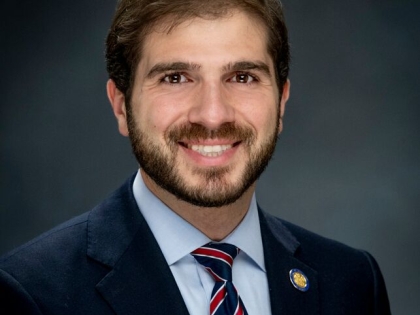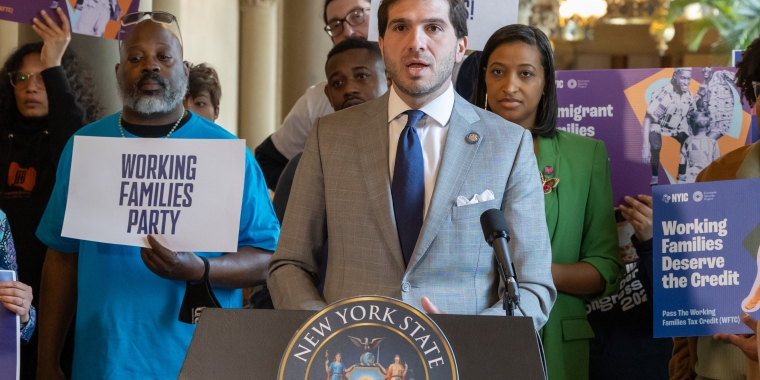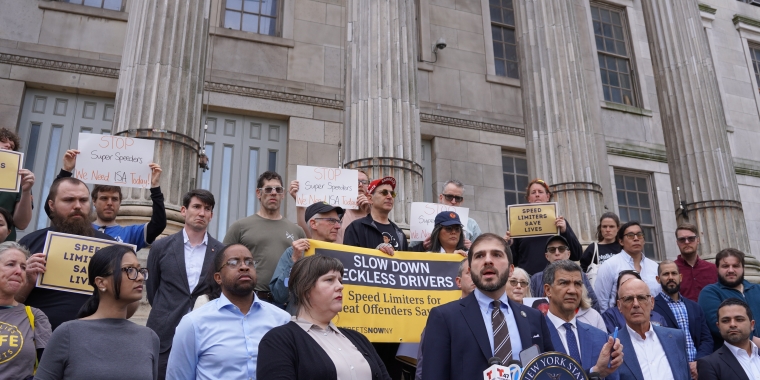
Lieutenant governor says state making it easier to get screened for cancer

Lt. Gov. Kathy Hochul (left) meets Dyker Heights resident Dianne Amato, a breast cancer survivor, at the breakfast.
BOROUGHWIDE — New York State has made major strides in the fight against breast cancer in recent years, according to Lt. Gov. Kathy Hochul, who told an audience at a breakfast event Wednesday that ensuring people have access to medical facilities for cancer screenings is a top priority of the Cuomo administration.
“New York State is investing in programs for women,” said Hochul, speaking at the 62nd Precinct Community Council’s Pink Breakfast, a fundraising event held to mark October as Breast Cancer Awareness Month.
Monies raised at the breakfast will be donated to the American Cancer Society, according to Sonia Valentin and Denise Daniello, the two women who organized the event. The breakfast took place at the Bensonhurst Center for Rehabilitation and Health Care, which co-sponsored the event.
The state places a priority on “elevating women” and “providing access to quality health care,” Hochul said, as she stood in a ballroom decorated in pink, the color that has become associated with the effort to raise awareness of breast cancer.
As a result of the state’s efforts, 50,000 more women were screened for cancer in 2018 than in 2017, Hochul said.
Gov. Andrew Cuomo secured $91 million in the state budget to ensure accessibility to screenings and treatment, according to Hochul, who said that the state also requires health insurance companies to cover the costs of screenings.
Hochul pointed to a campaign called “Get Screened, No Excuses,” that started in 2016 and seeks to increase the numbers of women who get annual mammograms. The state also has a law requiring 210 health care facilities around the state to have evening hours as well as Saturday hours to provide greater access for women who cannot take time off from their 9-to-5 jobs to get screened.
The state has also worked with local elected officials and community-based organizations to bring mobile vans to neighborhoods so that women can get mammograms.
But women also need to step up, according to Hochul, who said females tend to put others’ needs ahead of their own and avoid looking after their own health. “What do women do? They put everyone else first. The best way to take care of your family is to take care of yourself,” she said.
“We can beat this disease because it is all about early detection. It is no longer a death sentence. Get screened. Your state is behind you,” Hochul said.
Dyker Heights resident Dianne Amato, a breast cancer survivor, said a screening saved her life. She was diagnosed with breast cancer in January of 2001 following a mammogram and a sonogram.
“The year 2001 was filled with chemotherapy and radiation treatments for me. But I got through it,” Amato told the Home Reporter. “Now, I want to encourage all women to go for mammograms and sonograms, especially sonograms, because the mammogram can be wrong,” she said.
The statistics on breast cancer in the U.S. are sobering.
Breast cancer is the most common type of cancer in women and it is the leading cause of death in Hispanic women, according to the U.S. Centers for Disease Control and Prevention. In 2016, the most recent year for which figures are available, 245,299 new cases of breast cancer in women were diagnosed in the U.S.
In New York State, 16,057 new cases of breast cancer were reported in 2016.
“We all know someone who has been touched by breast cancer. Everyone gets touched by this disease,” State Sen. Andrew Gounardes told the audience at the breakfast.
Gounardes, a Democrat representing Southwest Brooklyn, praised the 62nd Precinct Council for organizing a fundraiser. “It’s good to raise funds for a cure for cancer,” he said.
Valentin, a longtime member of the precinct community council, said the fundraiser meant a lot to her. “A family member of mine has breast cancer. So now it’s personal to me,” she said of the fight to find a cancer cure.
Capt. Anthony Longobardi, commanding officer of the 62nd Precinct, said he is pleased the community council organizes events like Wednesday’s breast cancer fundraiser. “In terms of cancer prevention, awareness is important. And events like this help make people aware,” he told the Home Reporter.


